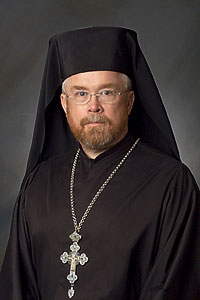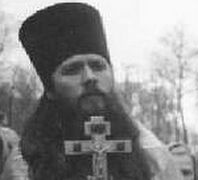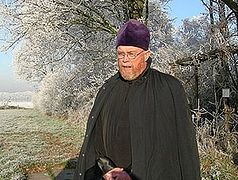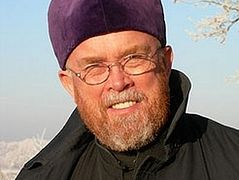Archimandrite Meletios (Webber), of Scottish background, was born in London, and received his Masters degree in Theology from Oxford University, England and the Thessalonica School of Theology, Greece. He also holds an E.D.D. (doctorate) in Psychotherapy from the University of Montana, Missoula. He is the author of two published books: Steps of Transformation; an Orthodox Priest Explores the Twelve Steps of Alcoholics Anonymous (Conciliar Press, 2003); and Bread and Water, Wine and Oil; an Orthodox Christian Experience of God (Conciliar Press, 2007).
Fr. Meletios has served as parish priest in England, Greece, and the United States, and currently serves as a guest priest in the Moscow Patriarchate, St. Nicholas Church in Amsterdam.
In Part One of this interview, he talks about his experience in Greek churches in London and the United States, and the Russian parish in Amsterdam.
 Archimandrite Meletios (Webber) Archimandrite Meletios (Webber) |
| Archimandrite Meletios (Webber) |
Fr. Meletios, could you tell us a little about your journey to Orthodoxy in Oxford, and how you became a priest?
I went to Oxford as a theology student in 1968, and very quickly found an Orthodox Church there. The parish priest at the time was Fr. Kallistos Ware, who is now Metropolitan of Diokleia, and the deacon at the time was Fr. Basil Osborne, who is now Bishop of Amphipolis. The parish in Oxford was both a Russian and a Greek one, coexisting in a small room in what had once been the house of the famous Dr. Spooner.[1] I was immediately attracted to the quality of the stillness that I found in that small room. That has been something that I have consistently valued in the Orthodox Church ever since. It is a quality which is difficult to talk about, but it happens when one goes into a space which is so obviously God-filled. That is something that I found very important and very attractive at that time. Under the tutelage of Fr. Kallistos I became Orthodox three years later, and I was ordained a priest some three years after that in January of 1976, by the Greek Archbishop of Thyateira in Great Britain, and served with that bishop as his chaplain for a number of years. My first parish in Britain after I returned from my studies in Greece was in an area of London called Harrow. From Harrow I went to the United States and spent 22 years there, before returning to Europe to live in the Netherlands in 2005.
In which parishes did you serve in the U.S.?
In the beginning, in 1984, I served as the parish priest in the churches of the state of Montana. There were three active parishes, two missions, and several other groups. This was with the Greek Archdiocese. I used to travel a very great deal throughout the year, which was at times a little more exciting than I wanted it to be. The people were very scattered, but very few in number. A trickle of converts started toward the end of my time there, but for the most part I was serving Greek Americans.
Were there any converts at all while you were there?
In Great Falls, Montana there was an air force base, and we had a number of very fine converts coming to us from that direction. We baptized a few families who were attracted to the Church from that place. It would be difficult to say that the Greek community found it easy to accept non-Greeks, because they saw themselves as a sort of bastion of Greekness. They were very friendly on the whole, but they simply did not know how to react to people who wanted to join the Church who were not Greek, who didn’t speak Greek, and so on. They also found it difficult at that time (and I think this is still the case), to keep their children in Montana. Almost everyone would leave the state as soon as they were able, in search of employment or education.
Because Montana simply does not have very much to offer in the way of employment or education?
Certainly in Great Falls there wasn’t. In Missoula and Billings there are universities; in Missoula there was quite a thriving Orthodox community. But even then, with the exception of two or three of my former altar boys, who went to get their law degrees and then returned to practice in Montana, most people found it difficult to find professional development in Montana. It is a problem in a state which has a huge surface area and a relatively small population.
Where did you serve after Montana?
I went to what is known in America as “The Bay Area,” meaning the area around San Francisco, and became the chancellor of what was then the Greek diocese of San Francisco, with Bishop Anthony. I served with him as chancellor for two years, during which time I served as parish priest in Santa Cruz. After I ceased being chancellor, I was then full-time parish priest in Santa Cruz, for another nine years.
Is that the same parish in which the murdered Fr. John Karastamatis[2] served?
Yes. He was not my immediate predecessor; there had been three other priests in between. I knew his presbytera quite well, and his children. He was murdered on the premises of the church, in very unpleasant circumstances, some years before I arrived, but it was still a very dominant factor in the life of parish while I was there—something they couldn’t forget.
In your experience as a pastor in America, with the Greek population and later with a slightly more diverse group, what would you say is the most challenging aspect of being a pastor there?
I think that there are many problems, but none of them is insurmountable, so long as the focus of parish life always centers upon the words of Jesus and the Gospel. It is easy to become distracted into the realms of, for example, Greek culture and cooking, or folk dance, all of which are wonderful activities in themselves, but can never be the backbone of parish life. The backbone of parish life has to be spiritual in nature, and based very firmly upon the Gospel. So, the interests of parishioners can be in one direction, and those of the pastor in another, and it is up to the pastor to help the people whom he is serving stay focused on what is important; encouraging them, of course, in all these other areas as well, but making sure that the spiritual core is always present in everything that they do.
Did you ever find that it was a challenge for your Greek parishioners to have a pastor, even a chancellor, who was not at all Greek?
Yes, well, you would have thought so. But when I was in London I was serving a community that was almost entirely Cypriot, and also Greek- speaking. I survived that experience reasonably well. They used to call me in the Cypriot dialect “O kochenos,” which means “The red-haired one,” since I had red hair in those days. I have always found that although I am not Greek, I speak Greek reasonably well, and I can feel Greek enough to participate in Greek parish life—sometimes perhaps too much so. (Perhaps a little stoic reserve would be more applicable.) But because I speak the language, with very few exceptions (and there have been some), I have never been made to feel an outsider.
Bishop Anthony (whom I mentioned earlier, and who went on to become Metropolitan Anthony, reposing in 2004, on Christmas day), was not an easy man to work with in many ways. But the one thing that always surprised me about him was that with regard to ethnicity, he was sort of color blind. He actually forgot that the people around him were Greek, or not Greek. It simply was not important to him. This was one of his great strengths, actually, in bringing the metropolis together.
Now that you have come to Holland, you are entering into a new realm—the Russians, the Dutch, and other Europeans who are living in Amsterdam, a cosmopolitan city. Could you describe what the parish life is like in the Russian Church in Amsterdam?
First of all, the parish itself is a great deal larger than any other parish I have served in before. Apart from those two years when I was Chancellor and had oversight over a number of parishes, all of the parishes in which I worked personally had around fifty to a hundred families. Suddenly, when I come to Amsterdam, there is a huge parish with a very flexible congregation—new people seem to turn up every week The number of languages flying around is just something that you just have to get used to. In the altar four languages certainly are quite common amongst the clergy themselves.
Those being…
French, Dutch, Russian, and English; occasionally there are other languages, too. This being only us communicating amongst ourselves, in order to know what we are supposed to do.
French being a sort of lingua franca?
Yes. I don’t think there is actually a French person there. But we do have some people who are very, very qualified in language skills. One of our deacons is an international translator who works for President Putin and other people of that ilk, as the need arises.
Is he Russian?
No, he is actually Dutch. He speaks four languages fluently. He occasionally translates my sermons, which I enjoy immensely. I deliver them in Dutch, and he translates them into Russian. He catches nuances in what I am saying that I’ve missed. I am just amazed at his skill. He is a very young man. It is quite exciting.
Parish council meetings (which I don’t attend) are entirely bilingual, so everything has to be said in Dutch and Russian, and I should imagine that that becomes at times something less than a pleasure.
Twice as long?
Twice as long; and the subject matter at parish meetings is at times not so interesting, or not so important to the central interest of the parish. But I suppose that is just parish life.
Which is the dominant nationality there now?
I would have to say that the dominant group would be the Russians, most of whom have come to Europe fairly recently. There are very, very few old Russians left from previous immigrations, the notable exception being Matushka Tatiana, the wife of the reposed Fr. Alexei (who was Dutch). There are very few, if any, of that generation. There are some older women—particularly women—from a new generation; but that’s another matter—they came over as old ladies.
Is this mixture of Russian and Dutch harmonious?
I would say that it really is. I have been in parishes in England and in the U.S., where people tended to get very defensive about languages. In Holland that is not the case, and in Amsterdam, certainly not. We have a system of trying to balance the languages which seems to work very well. And I don’t think I have ever heard a complaint that we were using one language more than another. Occasionally I have to break into English or Greek during the services, bearing in mind that I know most of the services by heart in Greek, not even as well in English. People will sometimes comment on that, mostly not in too brusque a manner, but it is often the best I can do, if I am in a situation wherein I can’t find the book I need, or if I am in a hurry.
Do you know any Russian?
Yes, I also use Church Slavonic in the Services.
Can you speak to the Russians in their own language?
To a certain extent. I need some help to learn a bit more Russian. I do hear confessions in Russian, but that is more instinctive than linguistic, and normally I reply either in English or Dutch, depending upon what the person’s language skills happens to be.
I understand that the difficulties that occurred in the London Moscow Patriarchate parish have been more or less smoothed out by this time. But in your opinion, what could have been the underlying problem which could have made it so difficult for the new Russian immigrants to coexist with the local converts—a problem which does not seem to exist here in Amsterdam?
I have never been a member of the parish in London, although I have known about it for forty years or so. I could be quite wrong in what I am about to say, and I certainly do not want to offend anyone. I, like many, many other people, regard Metropolitan Anthony Bloom as a very important part of my Orthodox formation, and I venerate his memory as do many, many others. I think what we saw there—somewhat encouraged by Metropolitan Anthony—was a very high level of expectation as to how the diocese would develop as he got older, and eventually what would happen after he died. But the circumstances in Russia were such, that by the time that happened, the reality was altogether different from any possible dream that anyone might have had. And I think that the reality and the dream simply didn’t mix. I don’t necessarily think that anyone is to blame for this. I know that many feelings were hurt, but I don’t see any wrong-doing on anyone’s part; I think it was simply people doing their best to fight for what they thought was right and just—on both sides. But it is a situation with which Vladyka Anthony himself never really came to grips; and by the time the Soviet Union dissolved, he was already a very old man. Whilst he was mentally very strong right to the end, coping with the sort of ecclesiastical needs of the new Russians was something he had never had to do. He was ministering mainly to English people in very small, rural communities. There were a couple of exceptions, but on the whole, that was where his main influence seemed to lie.
Then, all of a sudden he was confronted with the huge ecclesiastical needs of a lot of Russians in cities, which was not where he was actually comfortable. That is a bit of a guess. I may be entirely wrong on that, but this seems to be part of it.
This is a point of view of someone who was not in the thick of it, an objective observer.
How would you, in a few words, characterize this new burst of immigration coming from Russia and Eastern Europe in general? Is the majority or only a small percentage coming to the Church? How does this big wave of immigration affect the Church?
I think that several things happened relatively quickly when the Soviet Union dissolved. One comment that was made to me by a Russian, which I find quite interesting, was that for a lot of people, once the Communist Party was, as it were, no more, they latched onto the Church as being a point of stability in social life. And it was as if the Communist Party were replaced by the Church. We are not talking here about matters of faith, but simply about social structure, how people live their lives, what they do when they get up in the morning, and how they see the world when they look out the window. If that is true, then the Church obviously has a huge burden of evangelizing, bringing the Gospel to these people. I think that is what we see happening.
Typically the Orthodox method of doing such a thing isn’t by making church life attractive, by trying to “sell” an idea, or imposing an ideology upon people, but rather to open the doors of the parishes, to welcome people when they arrive, to make them feel at home, and gradually to educate them in the prayer life, which is after all, what the Church really has to offer. Of course, it is not an activity where efficiency counts for much. You’re looking for quality rather than quantity.
I would say that the Russian population in Amsterdam is something in the region of six or seven thousand people, which in comparison with the total population isn’t that large. Nevertheless, the congregation on Sunday morning is only, say, 350 people, including the non-Russians. So, yes, there is a great deal more that can be done.
The outreach has to be for Orthodoxy on a personal level. The era for the conversion of Russia was already a thousand years ago, and I don’t think those tactics would work on a modern group—the baptism by sword-point is no longer even desirable. The long term answer is for the Orthodox in Amsterdam to live lives which are attractive enough to people who are potentially Orthodox, so that they can be attracted to what the Church has to offer. We are greatly blessed—we have a wonderful bishop, we have fine clergy, and although they are all human beings, there are very human aspects of Church life as well. The very heart of what is going on is the proclamation of the Gospel.



